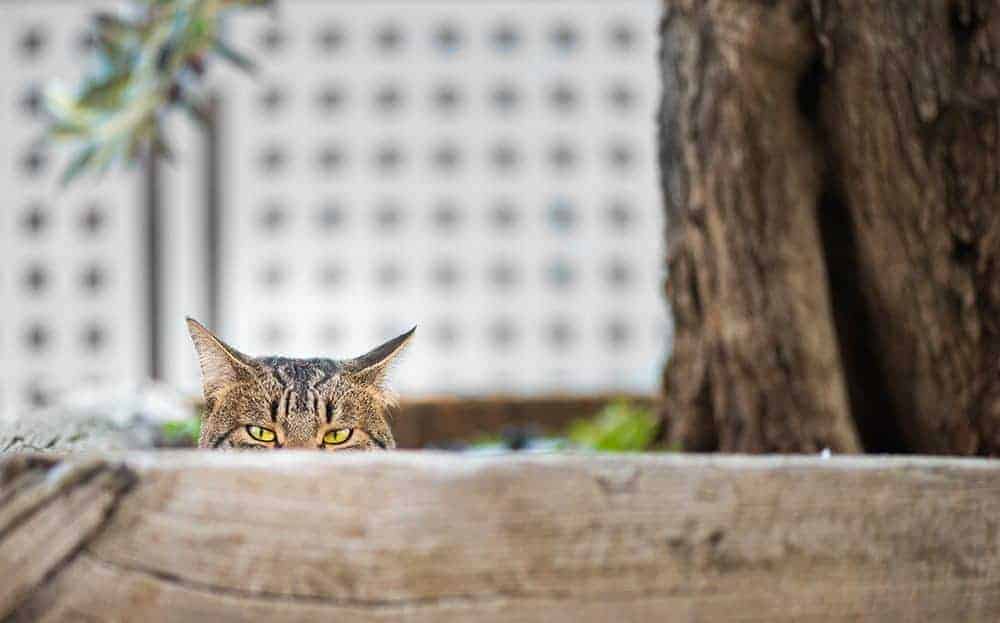
One of the strongest traits of cat behaviour is territoriality. Every cat spends much of his or her time familiarising themselves with an area (your house, garden and immediate vicinity), patrolling, monitoring and defending it.
Other cats are regarded with deep suspicion as cut-throat competitors. This trait is so strong that where there are several cats in one neighbourhood, a kind of territory time-share develops. Common areas are crossed at different times of the day so that neighbouring felines can go about their business while managing to avoid each other.
So why is territory such a priority for cats? The answer, according to Claire Bessant, feline expert, Chief Executive of International Cat Care and author of The Secret Life of Cats: Everything Your Cat Would Want You to Know lies in understanding their natural survival instinct. She writes: “Just because cats live in our homes and we feel they are safe, it doesn’t mean that their instincts for safety and a refuge are removed. Thus, in our homes, cats are still looking for a secure territory with plentiful food, but also a safe area.”
THIS IS MY SPACE
Although comfortably homed and well fed, our pet cats are almost identical to their wild ancestors and retain all the skills and instincts required to revert back to living in the wild if they need to – and a cat in the wild has to survive by hunting. Each cat needs an area where there is enough prey to provide for their needs. Female cats also need to be able to kill enough prey to provide milk and then food for growing kittens, as well as finding a suitable nest area where they can bring up their young safely. Unneutered males will have much larger territories, which they patrol in search of female cats, chasing off or fighting other males doing the same thing.
When looking at it from a cat’s genetically hard-wired perspective, it’s much easier to understand why territory is so important to them. Interestingly, the least territorial cats are likely to be neutered males. Claire adds: “Female cats seem much more determined to guard their spot in our homes – it seems more difficult to add a new cat to a home that already has a female cat in residence. Neutered males seem much more open to accepting a new resident, perhaps because they do not feel the basic need for a safe kittening area.”
DEFENDING THE BORDER
While most cats can adapt to their circumstances, balancing their need for territory defence with sharing the local area with other felines, it’s not so straightforward for all. If you are a young, fit unneutered tom, you’ll find it a cinch to fight off a rival and scare other cats away. If you are of a more nervous disposition, had a bad experience or are getting on a bit, it can make you stressed, scared and withdrawn. If this is the case, you’ll need to rely on your human for some help defending the border.
If your cat is being troubled by feline intruders who are preventing them from enjoying time outside, here are some tips:
- Accompany your cat outside to give them confidence. If a neighbouring cat shows up, you can shoo them off and show them in no uncertain terms that this is not a place that they are welcome to visit.
- Go on watch, armed with a water pistol. When the feline interloper appears, a shot of cold water will make coming into your garden an unpleasant, but not harmful, experience, which should put them off making a return trip.
- Install a cat fence system such as FeliSafe or Katzecure that makes it difficult for other felines to get over and into your garden.
- Install a microchip-operated cat-flap that only admits entry to your cat, so they know they have a safe haven indoors that other cats can’t access.
- Enlist the assistance of the family dog. Pet cats who live with canine friends know they can relax in their own garden. The family dog will think it part of their duty to guard the family cat and will have no hesitation in chasing away any strange felines who dare to place as much as a paw on the garden fence.
Sources: The Secret Life of Cats: Everything Your Cat Would Want You to Know by Claire Bessant, icatcare.org, wayofcats.com














